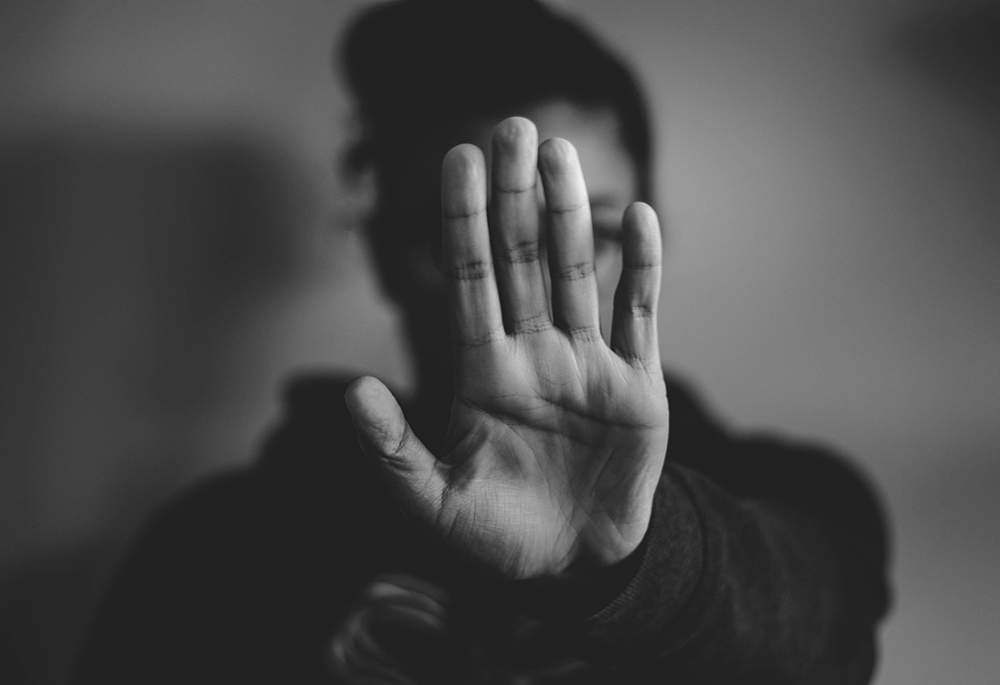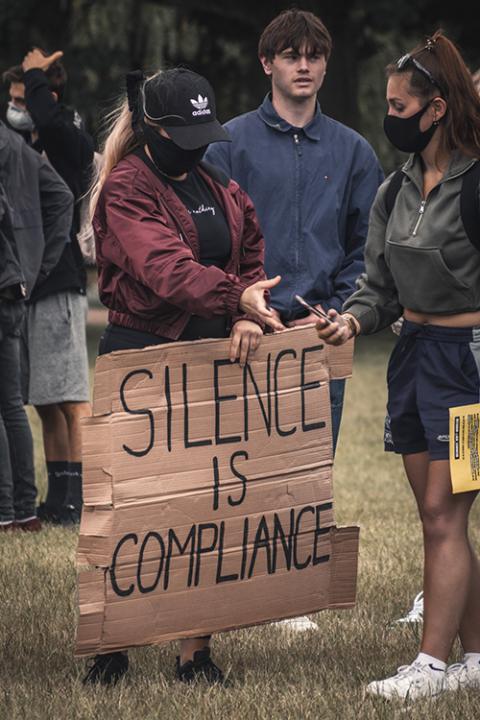
(Unsplash/Nadine Shaabana)
Bigotry toward Jewish people has been on the rise for a while. Now, following Hamas' attack on Israel, and Israel's declaration of war, Jewish communities are experiencing a new uptick in antisemitism. Progressive Jews in the U.S. who are critical of Prime Minister Benjamin Netanyahu's ultraconservative regime, and sympathetic toward the plight of Palestinians, have long been alert to antisemitism from the far right. But now U.S. Jews are experiencing hate speech from individuals who identify as leftist or progressive, too.
When expressions as basic and human as mourning the loss of innocent Jewish lives are met with mockery, it leaves people uncertain whom they can trust.
For individuals in vulnerable demographics, this kind of wariness is part of life. Members of Black, immigrant, Muslim and LGBTQ communities must consider their own safety daily. While individuals who are not in habitually targeted demographics may laugh at the idea of setting boundaries and finding safe spaces, for many it is crucial to their own well-being.
Since I am ethnically Jewish, I have experienced antisemitic hate speech and harassment frequently, usually online, but occasionally face-to-face. So, the question about who is trustworthy is a personal one.

People mourn at the graveside of Eden Guez during her funeral in Ashkelon, Israel, Oct. 10. She was killed while attending a festival that was attacked by Hamas gunmen from Gaza. (OSV News/Reuters/Violeta Santos Moura)
But I am also a Christian, and this poses a spiritual and moral challenge: Aren't I supposed to love and forgive my enemies? Shouldn't I be engaging in dialogue, not blocking people on social media? How can followers of Jesus balance these articles of faith against legitimate concerns for safety?
I once believed it was my obligation to forge friendships across ideological lines, even with those who had treated me unjustly or were open about their bigoted views. I believed that Christian peacemaking, and the mandate to forgive, meant staying on good terms with everyone, even those who had wronged me. I sincerely believed that if we could all just look across the lines that divide us and see the humanity in one another, we could heal the fractures in our culture. I even refused to unfriend people on Facebook.
But in the past few years, with the rise in antisemitic hate, I've discovered what others already knew: that setting boundaries can be as valid a Christian response as building bridges.
One factor influencing my shift in perspective had to do not with the openly malicious, but with the people who saw hate in action and were silent about it. Maybe these acquaintances felt I was overreacting to jokes about ovens and lampshades, or even that I deserved such attacks. Maybe they were unwilling to jeopardize their social capital by rocking the boat. Or maybe they think bigotry and prejudice are unimportant.
Presumably, these acquaintances have been aware of my humanity for a while, but that failed to be enough to prompt them to take a stand against antisemitic hate.
Setting boundaries can be as valid a Christian response as building bridges.
I take issue with the idea that, as a follower of Jesus, I need to maintain close ties even with those who have enabled or ignored bigotry. Setting boundaries, creating some distance and protecting oneself or one's community is not a violation of Jesus' mandate to forgive.
Forgiveness doesn't mean accepting abuse, and it certainly shouldn't mean passively allowing the abuse of others. But unfortunately, some Christians use the Gospel teachings about radical peacemaking as a template for protecting the status quo.
Many of Jesus' teachings about forgiveness were directed not at the vulnerable, but at the privileged. After Jesus tells Peter he should forgive "seventy times seven," Jesus illustrates this with the parable of the unforgiving servant (Matthew 18:21-35).
In this story, a servant owes a debt to a king that is too great to be repaid, but the king takes pity on the servant and forgives him his debt. Immediately afterward, however, that servant encounters a fellow servant who owes him money and demands immediate payment. The king, hearing of this, becomes angry, since he extended mercy to his servant but the servant failed to have mercy himself.
Yes, the message of the parable is that God has generously forgiven our sins, so we should forgive the sins of our neighbors. But the obligation, in Jesus' story, is placed on the one who has more clout in the relationship. Even the language of indebtedness indicates an uneven balance of power. Those who are privileged, if they wish to follow Jesus, must forgive the debts owed them by those less fortunate.
Jesus' mandates about revenge have also been revised to benefit the unscrupulous and deny justice to the oppressed. We have gotten used to placing commandments like "turn the other cheek" in contemporary contexts and forget that Jesus was presenting them to audiences for whom older traditions of revenge and retaliation, the laws of lex talionis, were still familiar.
Advertisement
Contrary to many popular beliefs about Jesus' teachings and their relation to Jewish law, the Judaism of Jesus' time did not teach that one was entitled, literally, to gouge out someone's eye if they had gouged out yours. In this respect, Jesus' precepts were not too different from those of other Jewish teachers of his day.
Nevertheless, customs of retaliation had deep roots in both the Hebrew and Roman traditions that formed the world Jesus lived in. Less than a hundred years earlier, the Roman philosopher Cicero argued for a form of lex talionis in his De Legibus.
In a culture where violent retribution was mainstream, Jesus taught his disciples not to indulge in revenge. But opting not to retaliate shouldn't mean refusing to protect oneself from injustice, any more than pursuing peace should mean passivity in the face of evil.
"We must take sides," Elie Wiesel famously stated, in his 1986 Nobel Prize acceptance speech. "Neutrality helps the oppressor, never the victim. Silence encourages the tormentor, never the tormented. Sometimes we must interfere."
From the earliest days of the church, saints and revolutionaries have lived the Gospel with the radical courage of Jesus' message, finding creative and nonviolent ways to oppose oppression. From the virgin martyrs who resisted imperial and patriarchal powers that tried to reduce them to objects and possessions, to the anti-racist activists who stand strong against systemic injustice today, many have witnessed what it means to choose peace while also taking sides.
Unfortunately, many have also used principles of Gospel peacemaking as excuses to remain neutral in the face of oppression, or to shame victims of systemic injustice when they finally erupt in just anger. Others have weaponized Jesus' precepts to shame abuse survivors or protect abusers, especially those with influence in church communities.

Black Lives Matter protesters in Leamington Spa, England, in June 2020 (Unsplash/Danny Lines)
True Christian virtue does mean rejecting violent retaliation. It does mean choosing love over hate. Sometimes it means making sacrifices. But this doesn't mean we have no value or dignity or rights as persons. Nor does it eliminate our obligation to stand up for what is right and speak out clearly when someone is behaving in a predatory manner, or when vulnerable lives are threatened.
The Christian call to holiness is not just about individual spiritual perfection. It is also about preserving the common good, the welfare of the community, and the dignity of all creation.
There may be times when "carrying one's cross" is a valid response to suffering, or when it is prudent to endure injustice without speaking up. But we should always ask ourselves, especially if we have a degree of privilege, how our individual choice affects the broader community. Does it mean not holding predators accountable? Does it mean letting them get away with doing harm, so they feel empowered to keep on doing it, perhaps to others in more precarious circumstances?
The choice to remain in cordial relationships with those who choose to cause, enable or ignore injustice entails the responsibility to address the issue. Simply being friendly and fun isn't going to change anyone's mind, but it may send the message that I have no problem with their views. So, if I am not ready to challenge everyone who engages in toxic behavior, or if I am exhausted from dealing with too many issues at once, withdrawing and setting boundaries — whether in person or online — is a legitimate option.
This doesn't mean ignoring injustices or putting one's head in the sand. It means sending a message that I will not maintain relationships where my affability is taken as permission to carry on doing harm, whether to others, to my community or to me.
If only working for peace were as easy as being affable with everyone. If only we could solve our world's injustices and resolve centuries-old geopolitical disputes by having parties to which everyone is invited. But if peace and justice work were so easy, everyone would be doing it. And human history might not be so stained with blood and tragedy.








